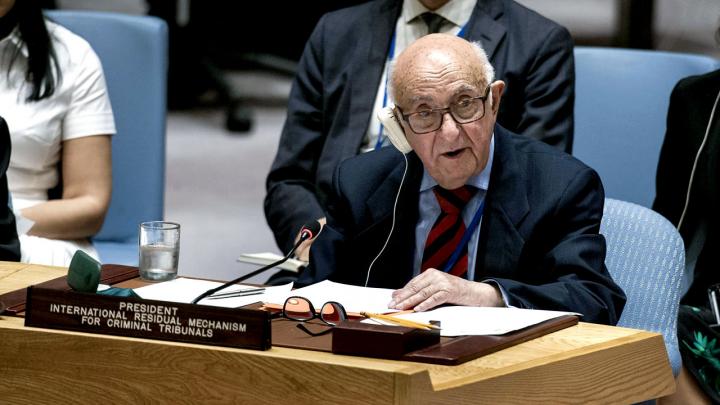President Meron presents Progress Report to UN Security Council

The President of the Mechanism for International Criminal Tribunals (Mechanism or MICT), Judge Theodor Meron, today addressed the United Nations Security Council to present the latest six-month report on the progress of the Mechanism’s work.
In his remarks, President Meron highlighted that the Mechanism “continues to make excellent progress in the handling of its judicial work and is, indeed, seeing a steady increase in judicial work over time”. In this regard, the President reported that 146 decisions and orders have been issued by the Mechanism in the first five months of 2017. A number of rulings from the reporting period were issued in the Stanišić & Simatović case - the first full trial before the Mechanism – which is scheduled to commence on 13 June 2017. The President also reported that the briefing in the Karadžić and Šešelj appeals has been completed and preparation of those cases for appeal hearings is progressing rapidly.
President Meron further underscored that a significant amount of the judicial work at the Mechanism relates to a wide array of matters other than the major cases, including allegations of contempt, requests for the review of judgement, and applications for early release. Mechanism judges also regularly address requests from national jurisdictions seeking variation of protective measures, and access to confidential evidence or information. In this regard, the President noted that of the 366 decisions and orders issued between mid-May 2016 and mid-May of this year, 164 – or approximately 45% - related to requests for variation of protective measures and other motions seeking access to confidential information. These matters are for the most part assigned to Single Judges working remotely.
President Meron recalled that substantive proceedings in the Ngirabatware case remain at a standstill due to the on-going detention of Judge Aydin Sefa Akay by the Turkish authorities notwithstanding the assertion of diplomatic immunity for Judge Akay by the United Nations in October 2016. The President stressed that the situation places in jeopardy the integrity of the remote model of judging envisaged by the Security Council and, more fundamentally, undermines the principle of judicial independence. Drawing the Security Council’s attention to Turkey’s failure to comply with the Mechanism’s order to cease all legal proceedings against Judge Akay and to release him, the President called upon the Council “to take such measures as may be necessary to achieve an appropriate resolution to this unprecedented situation”.
President Meron also informed the Security Council that the Mechanism had recently concluded a revised agreement on the enforcement of sentences with the Government of Benin. Moreover, President Meron noted that the Mechanism and the Government of Senegal are currently in the final stages of implementation of Senegal’s decision in principle to accept eight prisoners into cells in Senegal refurbished together with the United Nations.
In closing, President Meron called on the Members of the Council not to allow the challenges in the realm of international relations to erode the vital progress made by the United Nations and the Security Council in strengthening the rule of law and ensuring greater accountability under international law.